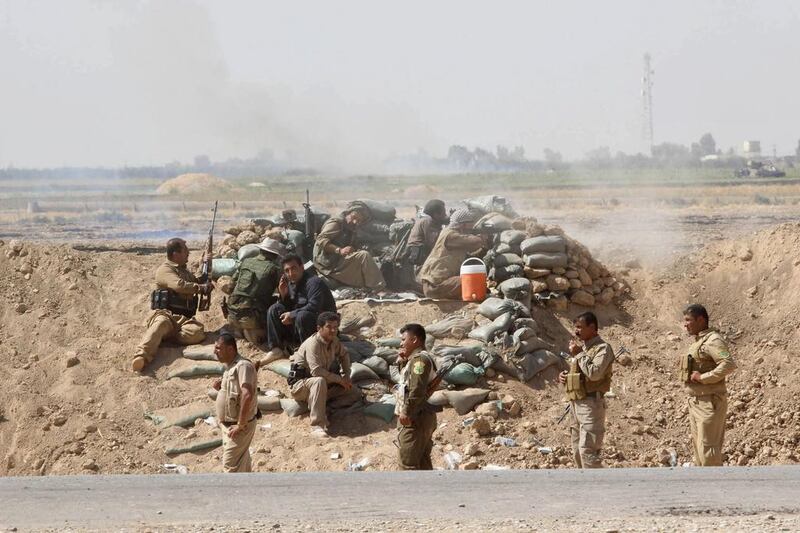ERBIL, Iraq/MURSITPINAR, Turkey // Iraqi Kurdish troops drove ISIL fighters from a strategic border crossing with Syria on Tuesday and won the support of members of a major Sunni tribe, in one of the biggest successes since US forces began bombing the fighters.
The victory, which could make it harder for militants to operate on both sides of the frontier, was also achieved with help from Kurds from the Syrian side of the frontier, a new sign of cooperation across the border.
Iraqi Kurdish forces receieved additional assistance from British warplanes, which struck ISIL targets in Iraq on Tuesday for the first time since the UK’s parliament approved military action against the militant group.
Two Tornado jets on an armed reconnaissance mission from the Royal Air Force base at Akrotiri in Cyprus were sent to help Kurdish troops in north-west Iraq, the UK ministry of defence in London said.
In a battle that began before dawn, Iraqi Kurdish peshmerga fighters took control of the Rabia border crossing, an Iraqi Kurdish political source said.
“It’s the most important strategic point for crossing. Once that’s taken it’s going to cut the supply route and make the operation to reach Sinjar easier,” the source said, referring to a mountain further south where members of the Yazidi minority sect have been trapped by ISIL fighters.
The participation of Sunni tribal fighters in the battle against ISIL could prove as important a development as the advance itself.
Members of the influential Shammar tribe, one of the largest in north-western Iraq, joined the Kurds in the fighting, a tribal figure said.
“Rabia is completely liberated. All of the Shammar are with the peshmerga and there is full cooperation between us,” said Abdullah Yawar, a leading member of the tribe.
He said the cooperation was the result of an agreement with the president of Iraq’s Kurdish region after three months of negotiation to join forces against the “common enemy”.
Gaining support from Sunni tribes, many of which either supported or acquiesced in ISIL’s June advance, would be a crucial objective for the Iraqi government and its regional and western allies in the fight against the insurgents.
Winning over Sunni tribes was a central part of the strategy that helped the US military defeat a precursor of ISIL during the “surge” campaign of 2006-2007. Washington has made clear it hopes the new Iraqi government of prime minister Haidar Al Abadi, who took power last month, can repeat it.
Rabia controls the main highway linking Syria to Mosul, the biggest city in northern Iraq, which ISIL fighters captured in June at the start of a lightning advance through Iraq’s Sunni Muslim north that jolted the Middle East.
Twelve ISIL fighters’ bodies lay on the border at the crossing after the battle, said Hemin Hawrami, head of the foreign relations department of the Kurdistan Democratic Party, one of the main Iraqi Kurdish parties, on Twitter.
Syrian Kurdish fighters said they had also joined the battle: “We are defending Rabia ... trying to coordinate action with the peshmerga against [ISIL]. It is true,” said Saleh Muslim, head of the Syria-based Kurdish Democratic Union Party (PYD).
If Rabia can be held, its recapture is one of the biggest successes since US-led forces started bombing ISIL targets in Iraq in August.
It is one of two main border crossings between militant-held parts of the two countries, control of which has allowed ISIL to declare a single caliphate on both sides. The other main crossing, Albu Kamal on the Euphrates River valley motorway, has been a primary target of US strikes on both sides of the frontier this past week.
The ability to cross the frontier freely has been a major tactical advantage for ISIL fighters on both sides. Fighters swept from Syria into northern Iraq in June and returned with heavy weapons seized from fleeing Iraqi government troops, which they have used to expand their territory in Syria.
Washington expanded the campaign to Syria last week in an effort to defeat the fighters who have swept through Sunni areas of both countries, killing prisoners, chasing out Kurds and ordering Shiites and non-Muslims to convert or die.
In two complex, multi-sided civil wars, the Sunni fighters are battling against Shiite-backed governments in both countries, rival Sunni groups in Syria and separate Kurdish forces on either side of the frontier.
Washington hopes the strikes, conducted with help from European allies in Iraq and Arab air forces in Syria, will allow government and Kurdish forces in Iraq, and moderate Sunnis in Syria, to recapture territory.
In Iraq, a coalition of Iraqi army, Shiite militia fighters and Kurdish peshmerga troops have been slowly recapturing Sunni villages that had been under ISIL control south of the Kurdish-held oil city of Kirkuk.
“At dawn today, two villages near Daquq, 40 kilometres south of Kirkuk, peshmerga forces liberated them from [ISIL],” an Iraqi security official said.
* Reuters, with additional reporting by Bloomberg





